Copyright ©2007 PopEntertainment.com. All rights reserved.
Posted:
May 12, 2007.
Brooklyn Rules
has been a long time coming. The script is a labor of love by Terrence
Winter, one of the main writers on The Sopranos. The story was based
on his own youth, where he and his best friends grow up in the New York
boroughs in the middle of the mob wars.
Unlike most films about gangsters,
Brooklyn Rules does not glamorize the lifestyle. It just shows three
young kids trying to find their place in the world Ė with two of them
desperately trying to avoid the mobsters around them. Though one of the guys
fall in with the wiseguys, the other two use education and religion to find
their sense of self.
The script has been making the rounds for
years, catching the eyes of directors and stars before Michael Corrente came
into the picture. A producer and director (Outside Providence),
Corrente and Winter combined their passion to get their film made.
Finally, the film is ready to go, with a
stellar cast including Freddie Prinze, Jr., Scott Caan, Mena Suvari, Jerry
Ferrara (best known as Turtle from Entourage) and Alec Baldwin.
Even after the film was made it was still
fated to take the hard road Ė with Corrente fighting to keep control of the
release. After an original deal fell through, he resisted several overtures
to release the film straight to video because he believed so strongly in the
film. He believed strongly that it had to be released in theaters. Now it is
Ė starting with limited releases in New York, Los Angeles and Boston.
Eventually, if all goes well, it will get a much wider release.
ďItís very satisfying. When we made it
nobody wanted this movie,Ē Corrente said. ďIn a sense it makes me a little
crazy. Every piece of shit movie out there that gets released and a real
movie comes along with a great cast, a fantastic writer, a really wonderful
story and the current state of the movie business today is we have to pass
on movies like thisÖ If not for City Lights, honestly, we were a
hair's breadth away from having to release this on DVD. Itís mind boggling.Ē
The son of the
famous but ultimately tragic 70s comedian/sitcom star for whom he was named,
Freddie Prinze, Jr. has been working in show biz since he was a kid. Over
the years he has made many films including the Scooby-Doo films, I
Know What You Did Last Summer, Sheís All That, Boys and Girls and
Down To You. He also had his own sitcom called Freddie.
Mena Suvari first
caught our eyes in 1999 with
the one-two punch of American Pie and American Beauty. Since
then she has done a dizzyingly eclectic range of styles and genres. She has
worked on big bucks action pictures like Domino and The Musketeer
as well as comedies such Rumor Has It, Loser
and Beauty Shop. She is also in more intimate films like Stuck,
Caffeine, Spun and the upcoming Mysteries of Pittsburgh.
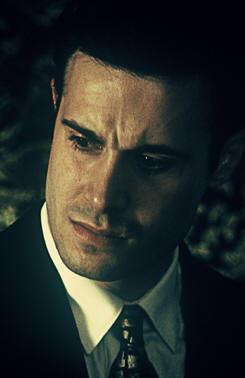 Prinze and Suvari met with us at the
Regency Hotel in New York, shortly before the Brooklyn Rules release
to discuss the project and their careers.
Prinze and Suvari met with us at the
Regency Hotel in New York, shortly before the Brooklyn Rules release
to discuss the project and their careers.
What did it take for
you all to connect like you did?
Mena Suvari:
A lot of late nights. A lot of drinking
binges. (laughs) I donít know.
Freddie
Prinze, Jr.:
It was twofold. Michael was very smart -- the director, Michael -- in the
regard that, during the rehearsal process, he'd start a conversation
casually. He'd start a conversation casually, and be like ... this is the
way Michael talks not me ... "Who's the first broad you nailed?" So I would
begin to discuss the first woman that I slept with, and you'd start talking
about how horrible you were, and it was like ten seconds long and she was
like 'what?' and it was really embarrassing ... and then the other guys
would start to chime in, and they'd crack jokes on you. Then you'd find out
that it was even less with them, and ha ha ha, and then Michael would say
"Now read the scene right now!" and we'd just go right into the scene with
that same type of energy and that same type of vibe. That really developed a
lot of the dialogue and the pace that was required for the scenes that we
were going to do.
Well, did you rehearse and talk about
the characters?
Mena Suvari:
(laughs) It just worked out
very well. We did the film threeÖ several years ago. But it worked out where
I loved the script and Iím just a fan of Michael Correnteís and the
characters. I was here just for a couple of days and I got the opportunity
to meet with him and I told him that I loved it and I wanted to be a part of
it. It just worked out. Iíd worked with Scott before. Everybody Ė Freddie
and Michael had been working together for a long time and finally got this
made. Iím just really happy about it and really happy to come together and
make it work with no, NO drama whatsoever. Easy.
No drunken nights?
Mena Suvari:
No. (laughs)
Freddie Prinze,
Jr.: As far
as chemistry, we just lucked out. Scott and I were confined to a trailer Ė I
kid you not -- that was smaller than this table. He would just chain-smoke
and I had a really bad habit of chewing tobacco.
Chewing tobacco?
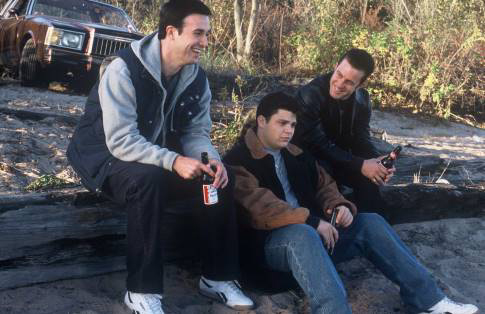 Freddie Prinze,
Jr.: Yeah,
I used to. I played baseball grew up in New Mexico and that was just what
you did. I quit. Thanks for your concern. So this inner door had to be
closed because it was cold and so the smoke's in there. We'd watch that one
scene in True Romance with Christopher Walken, and we'd do our
Walken impressions. His was much better, but my Roger Rabbit was better. We
would watch movies, and Scott and I, we just got along. I guess some of it
was maybe that we both had fatherís in thisÖ well, he still has a father in
this business, I had a father in thisÖ We both were sort of at the same age,
emotionally, so it was very easy for the two of us to bond. Jerry and Mena
had the nicer half of the trailer, where they had their own rooms. It's just
hard not to get along with Jerry. I don't know anyone who doesn't like him.
Kathleen Turner said, ďA movie is a marriage with a guaranteed divorce.Ē
I've really fought against that for the thirteen years that I've been doing
this, and she was right as rain. It was so rejected, the amount of love I
would put out there. This is the first film ever that we're still friends.
Jerry and I just played golf. I shot like a 122 and he shot like a 126. I
beat his ass, as bad as I am. We were drunk by the twelfth hole, but we just
had a good time. I speak with Michael all the time. Terry sent me a picture
of his baby. Like, I've never had that. I had it on my show, but that's TV
and film is very different. It's never worked, ever, and it's not from a
lack of effort, it's just never worked. I don't know why.
Freddie Prinze,
Jr.: Yeah,
I used to. I played baseball grew up in New Mexico and that was just what
you did. I quit. Thanks for your concern. So this inner door had to be
closed because it was cold and so the smoke's in there. We'd watch that one
scene in True Romance with Christopher Walken, and we'd do our
Walken impressions. His was much better, but my Roger Rabbit was better. We
would watch movies, and Scott and I, we just got along. I guess some of it
was maybe that we both had fatherís in thisÖ well, he still has a father in
this business, I had a father in thisÖ We both were sort of at the same age,
emotionally, so it was very easy for the two of us to bond. Jerry and Mena
had the nicer half of the trailer, where they had their own rooms. It's just
hard not to get along with Jerry. I don't know anyone who doesn't like him.
Kathleen Turner said, ďA movie is a marriage with a guaranteed divorce.Ē
I've really fought against that for the thirteen years that I've been doing
this, and she was right as rain. It was so rejected, the amount of love I
would put out there. This is the first film ever that we're still friends.
Jerry and I just played golf. I shot like a 122 and he shot like a 126. I
beat his ass, as bad as I am. We were drunk by the twelfth hole, but we just
had a good time. I speak with Michael all the time. Terry sent me a picture
of his baby. Like, I've never had that. I had it on my show, but that's TV
and film is very different. It's never worked, ever, and it's not from a
lack of effort, it's just never worked. I don't know why.
Mena,
your character and Freddieís character came from such different worlds. How
do you think that drew them together?
Mena Suvari:
With Ellen, sheís somewhat well off and
goes to Columbia. She catches onto Freddieís character Michael very quickly,
but she admires him. She falls for him, you know, starts to like him. I
think itís just that. The opposites attract kind of thing. Sheís on to him
and she sees through that. She sees him for who he really is and I think she
also sees a lot of potential in him and believes in him. I think itís really
just that kind of opposites attract. And I think Ellen Ė it was exciting to
her. She knows that heís a little bit more mysterious and possibly dangerous
than the other guys sheís around all the time.
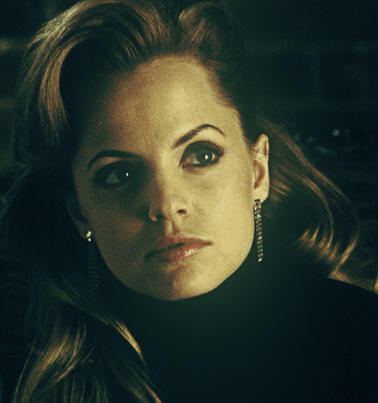 Freddie Prinze,
Jr.: It was
funny. Mena and I had a different kind of chemistry than I've ever had with
anyone else. There was something comfortable right away. Usually when I step
forward to a girl, they step backwards. That's just kind of the natural ebb
and flow to a scene. I stepped forward to Mena and she stepped forward to me
and I was kind of like stepping backwards. There was just this comfort
level. The first scene we had to do together was a scene in bed. She just
nuzzled right in and fit perfectly right into my chest. We just looked at
each other and did the scene and the scene became much quieter than it was
in rehearsals. She looked like Brigitte Bardot. It was like possessing her.
It was really weird. We had this wonderful chemistry. Then the last scene we
did together was on the roof, and so we already had this comfort and
protection and all you want to do is hold her and keep her warm, because
sheís this little thing. Even though sheís strong, but you want to protect
her. She doesnít need help from anybody. Sheís just this firecracker. But I
canít help it. Itís me. My wife is this big, too. Itís how I am. So, when we
did that scene, even though it was in the rain, a couple of lines changed
and some of the attitudes changed, but there was just this comfort level
that I haven't ever had. And I've had chemistry with other actresses before.
I've only not had chemistry once, (chuckles) and it was zero
chemistry. But other than that, I've always had it. I don't want to say it
was better, but it was. It was just better. There was just a comfort level
thatís never really existed before.
Freddie Prinze,
Jr.: It was
funny. Mena and I had a different kind of chemistry than I've ever had with
anyone else. There was something comfortable right away. Usually when I step
forward to a girl, they step backwards. That's just kind of the natural ebb
and flow to a scene. I stepped forward to Mena and she stepped forward to me
and I was kind of like stepping backwards. There was just this comfort
level. The first scene we had to do together was a scene in bed. She just
nuzzled right in and fit perfectly right into my chest. We just looked at
each other and did the scene and the scene became much quieter than it was
in rehearsals. She looked like Brigitte Bardot. It was like possessing her.
It was really weird. We had this wonderful chemistry. Then the last scene we
did together was on the roof, and so we already had this comfort and
protection and all you want to do is hold her and keep her warm, because
sheís this little thing. Even though sheís strong, but you want to protect
her. She doesnít need help from anybody. Sheís just this firecracker. But I
canít help it. Itís me. My wife is this big, too. Itís how I am. So, when we
did that scene, even though it was in the rain, a couple of lines changed
and some of the attitudes changed, but there was just this comfort level
that I haven't ever had. And I've had chemistry with other actresses before.
I've only not had chemistry once, (chuckles) and it was zero
chemistry. But other than that, I've always had it. I don't want to say it
was better, but it was. It was just better. There was just a comfort level
thatís never really existed before.
Mena Suvari:
Oh, it was different. I mean with FreddieÖ They are all so amazing, all
the guys in this. Freddie was such a gentleman. Very, very polite and very
considerate. Those are the things you want in any kind of scene you have
with somebody. Itís intimate. So, I was very lucky. It was great. Itís a
great movie and fun. Thatís how I like to approach the scenes that I work
on. Iíve been really lucky with that. Theyíre all just very, very sweet.
Have you had actors that werenít
polite?
Mena Suvari:
You know, everybodyís different. Yeah, there are some times whenÖ you
know, people either connect or they donít. I feel like Iíve been really
lucky with that. I feel like Iíve always kind of gotten along with the
people I work with. Thatís my goal.
I love that your
character is upwardly mobile and able to reach out to his friends. Was that
something that interested you about this character?
Freddie Prinze,
Jr.: The
main thing was I could just relate to him. I tell people I grew up in
Albuquerque, New Mexico and most people go, ďOh, that sounds so quaint.Ē
They donít realize that in the 80s it was the number one city in the country
for gang related murder, per capita. There was a group of four of us, and
the best one of us was taken away thirteen days before we graduated high
school. It shouldnít have been him. His name was Berto and he was by far the
best. He had this girlfriend. It was heartbreaking. So I could relate to
that.
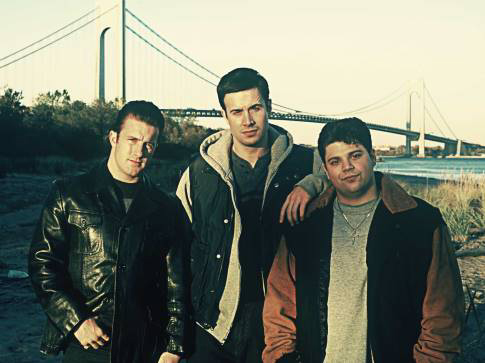 Do people still
relate to you as this young kid?
Do people still
relate to you as this young kid?
Freddie Prinze, Jr.:
It depends on the audience, you know? It depends on who I'm with. When you
have as much success as I did doing that thing Ė playing that guy that every
mother wishes their daughter would date, and she's busy dating a guy who
rides a motorcycle -- it's hard for them to invest in anything else. It's
funny. I pitched myself for this movie years ago, when Griffin Dunne was
attached to direct, and he just wasn't having it. He was the audience that
wasn't hearing how I grew up. I couldn't even get a meeting with this guy.
Fortunately, they got rid of that guy. (laughs and shakes his head.)
I think the real reason was their movie fell apart. It had nothing to do
with it. Their financing fell through. Years later, when Michael
(Corrente) was involved, I did get to meet and I remember sitting in that
room. It was him and (screenwriter) Terry (Winter) and Rachel Rothman who
produced it, and I'm making this passion play and I'm telling them ďI can
relate to this guy.Ē I don't trust them enough to tell them all the reasons
why, but I'm saying it was much as I can so they know I'm reaching out. I
said if you let me read scenes... I'm not afraid of auditions. If you put my
work up against every other guy that comes in here and read, I'm gonna beat
them. It wasn't me being arrogant. I just knew I was supposed to play this
part.
I was telling (wife) Sarah (Michelle
Gellar) this when I read the script. My wife believes in destiny and fate,
and I don't. She was like ďIt's destiny! You're meant to play this role!Ē I
was like, I don't know about that, but I'm fucking getting this part.
(laughs) So I went in and I read and I was fortunate enough that I
communicated what Terry was wanting to see and what Michael and Rachel were
wanting to see and I got the part. Because they took that chance on me, I
was willing to do things that many a therapist has tried to pull out of me
and failed. I beat them all. That my wife has tried to pull out of me. I got
her too. I relived some of that here. It was awful and horrible and I didn't
feel good Ė which is why I keep so much bottled in, why Iím so private in
the first place Ė but Michael created the safest environment possible to go
through something like that again. For Scott too. People think Scottís had
this sheltered life because he's James Caan's kid. No. No. It's just
perspective. His environment was different, but it's all about perspective.
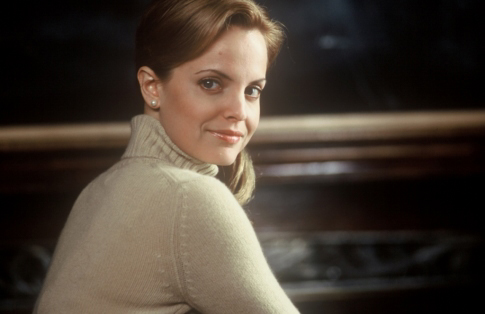 Mena Suvari:
Heís the man that made it go, man. Michaelís awesome. Thatís what you
want. You want somebody who is passionate. Vivacious. When I worked with
Tony Scott, come on, heís got a megaphone and heís on set yelling at
everybody. But I loved that, because Tony would come up to me when I was
working on Domino and he would literally jump and down. He would like
yell at me, trying to get me into this zone. My God! But thatís great. You
want somebody who is really in it with you. Michael was really there and
passionate about it and he wants it. You want to feel like youíre in good
hands.
Mena Suvari:
Heís the man that made it go, man. Michaelís awesome. Thatís what you
want. You want somebody who is passionate. Vivacious. When I worked with
Tony Scott, come on, heís got a megaphone and heís on set yelling at
everybody. But I loved that, because Tony would come up to me when I was
working on Domino and he would literally jump and down. He would like
yell at me, trying to get me into this zone. My God! But thatís great. You
want somebody who is really in it with you. Michael was really there and
passionate about it and he wants it. You want to feel like youíre in good
hands.
Freddie Prinze, Jr.:
So it was difficult, but I saw it on the screen and I realized that I had
never been proud of a movie before, like I thought that I had been. I've
said that I've been proud of movies, and I wasn't lying, I was just wrong. I
realized what pride was when I left that. I was quiet walking home. We saw
it in Tribeca and Sarah and I were walking home. She was kind of choked up
and wasn't ready for that scene with Jerry. And just really loved it and she
was like ďI've never loved you more in a movieĒ and I said I've never been
proud. I guess. All of a sudden all these things started coming. The feeling
was so good. With a film like this, you don't know if itís going to get
distribution. You don't know if anyone is ever going to see it. It's a small
movie, and I didn't care. I didn't care. Everything since that screening
with like ten people has been gravy. Everything's been gravy.
Michael was telling us about some of
the interesting things that happened in filming as an indie Ė for example
that roof scene it wasnít supposed to rain, but you couldnít wait around so
you improvised. Is that an interesting way to work compared to a film that
may have a little more budget and leeway like
Domino or American Beauty or
something?
Mena Suvari:
Those are things that I donít think about and I canít really. Itís just
relative. I never know what Iím going to get into, so the only thing I can
do is just make it start from the work and whether Iím interested in it or
not. You canít control any of this. So, itís just kind of the process. I
donít know ifÖ in that specific exampleÖ things would have changed that
night if it were a studio. We could have gone to a cover. I donít know.
Thatís just what you do. I donít expect to live a completely pampered
lifestyle. (laughs) You know, in my everyday work itís a challenge
and it can be grueling on some days.
Freddie, you and Sarah both worked with Alec Baldwin recently. Did you
compare notes?
Freddie Prinze,
Jr.: I
loved him to death. I'm not shying away from questions about Alec but I will
say that I love him to death. I know a lot of actors that aren't as good as
Alec and that aren't at the stature that Alec is at that have never bothered
to come to rehearsal Ė ever Ė because they got better shit to do. The ball
game is on. Alec was there every day. I'm a big believer in rehearsal. I
give all my rehearsals for free. Always have. Always will. I try to give two
weeks, most people, I'm surprised are happy with one. I'm always the first
guy on set and the last guy to leave, and this guy beat me there every day.
I would strategically leave early, but he's just been there. He was me, and
he knows all my tricks and how I'm going to get there early. He's just
schooling me. But I loved him.
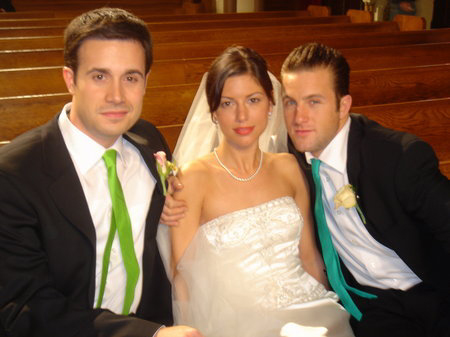 Iím a big believer in
letting these guys know. I've had the pleasure of working with Peter Falk
and with Ving Rhames and with Alec Baldwin and these guys whose work I
respect very, very much. I let them know, in a subtle way, I'm willing to be
a student if they're willing to be a teacher. And he so wants to be. I use
the word arrogant in the best way possible. He is arrogant enough to be a
teacher. I think you do have to have arrogance to be willing to shape and
mold a mind. He really was willing to do that, and it was near as good as
the experience was with Peter Falk. The only reason it wasn't was because I
spent more time with Peter. I only had a few scenes with Alec in this. It
was a day-to-day thing. Peter would call you up to his hotel room at 3 a.m.
(imitates) ďFreddie, get up here. Right fucking now.Ē Heíd chain
smoke all night long. We would go to like 6 a.m, just doing scenes. The only
reason that it made it better is that it was on a daily basis. But, I would
work with this guy any day of the week. Any time he wanted, whether it was
acting, directingÖ Whether he wrote it. I don't care. I respect Alec.
Iím a big believer in
letting these guys know. I've had the pleasure of working with Peter Falk
and with Ving Rhames and with Alec Baldwin and these guys whose work I
respect very, very much. I let them know, in a subtle way, I'm willing to be
a student if they're willing to be a teacher. And he so wants to be. I use
the word arrogant in the best way possible. He is arrogant enough to be a
teacher. I think you do have to have arrogance to be willing to shape and
mold a mind. He really was willing to do that, and it was near as good as
the experience was with Peter Falk. The only reason it wasn't was because I
spent more time with Peter. I only had a few scenes with Alec in this. It
was a day-to-day thing. Peter would call you up to his hotel room at 3 a.m.
(imitates) ďFreddie, get up here. Right fucking now.Ē Heíd chain
smoke all night long. We would go to like 6 a.m, just doing scenes. The only
reason that it made it better is that it was on a daily basis. But, I would
work with this guy any day of the week. Any time he wanted, whether it was
acting, directingÖ Whether he wrote it. I don't care. I respect Alec.
Mena, are you in to
mob movies and mob culture?
Mena Suvari:
A little bit. Yeah. Yeah. Definitely. I
have an interest, just the same as a lot of people do. I love The
Sopranos andÖ I donít know why. (laughs) For some reason thereís
definitely an American fascination with the blood and gore and violence of
the mob, and power and that kind of thing.
Did you know a lot about John Gotti and
the whole history of the 80s mobs before the film?
Freddie Prinze, Jr.:
Only because I was fascinated as a child. You know, your mother says, ďDonít
touch that. Itís hot.Ē The first thing you do is burn your hand. So my mom
was very antiÖ she gets mad if I watch The Sopranos. (Chuckles)
Iím a grown man and Iím scared to watch it, because I know sheís going to
find out. So I read a lot about him and I really tried to Ė back then we
used the microficheÖ (laughs) No kids will understand that. So I read
a lot of articles on him and Iíve read a lot of books on him. I never had a
lot of time to go to school, so at work I would read a lot.
It seems like mob
movies become American classics.
Mena Suvari:I think itís just like all those things that shouldnít be a part of
life. I feel bad being part of the film. (laughs) No. Itís a
lifestyle and thatís why itís so interesting. Itís so mysterious and not
something that youíre really exposed to.
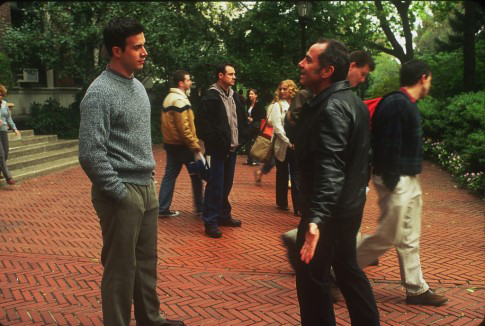 Freddie Prinze, Jr.:
There has always been something that has fascinated me about a government
that exists within a government. A set of rules that exists within another
set of rules. They pay no mind to the other set, as long as they donít
interfere. Iím not saying this is a good way of life, but Iím saying that
the I think the reason people like it is that it takes a lot of courage and
a certain type of character to disregard one set of rules and live by
another. Be willing to do whatever it takes to exist within those rules. I
read a lot of books about these guys and their philosophy on it. Itís always
been something thatís compelled me and I think Ė as much as you want to
believe a 31-year-old-no-college-education [guy], thatís why a lot of other
people are compelled by it, too. Theyíre regular people, theyíve just got a
different set of rules. Itís kind of like Vatican City. You realize itís the
smallest country in the world. They have their own form of government. They
arenít subject to any of the laws of Italy. But, that whole sort of system
within the system Iíve always been interested by. The Mexicans tried it. It
didnít work. The Mexican mafia. It didnít really work because the FBI had
already came after the Italian mafia so hard, by the time the Mexican mafia
tried to get organized, they were dismantled. But a lot of cultures have
tried it all over the world and have had a lot of success doing it. A lot of
success here until the Feds decided to get hip.
Freddie Prinze, Jr.:
There has always been something that has fascinated me about a government
that exists within a government. A set of rules that exists within another
set of rules. They pay no mind to the other set, as long as they donít
interfere. Iím not saying this is a good way of life, but Iím saying that
the I think the reason people like it is that it takes a lot of courage and
a certain type of character to disregard one set of rules and live by
another. Be willing to do whatever it takes to exist within those rules. I
read a lot of books about these guys and their philosophy on it. Itís always
been something thatís compelled me and I think Ė as much as you want to
believe a 31-year-old-no-college-education [guy], thatís why a lot of other
people are compelled by it, too. Theyíre regular people, theyíve just got a
different set of rules. Itís kind of like Vatican City. You realize itís the
smallest country in the world. They have their own form of government. They
arenít subject to any of the laws of Italy. But, that whole sort of system
within the system Iíve always been interested by. The Mexicans tried it. It
didnít work. The Mexican mafia. It didnít really work because the FBI had
already came after the Italian mafia so hard, by the time the Mexican mafia
tried to get organized, they were dismantled. But a lot of cultures have
tried it all over the world and have had a lot of success doing it. A lot of
success here until the Feds decided to get hip.
You didnít really have to meet any
real-life counterpoints in this film, did you?
Mena Suvari:
No. Somebody asked me that earlier. No.
What are you going to do? Find a rich girl?
Mena Suvari:
She asked me if I found somebody who went
to Columbia. I guess the gist of it was if there was somebody that went to
Columbia and dated somebody from the mob. (Laughs) I donít even know
how Iíd find somebody like that.
Put an ad in the
paperÖ
Mena Suvari:
I would be like could you find somebody in
Manhattan that went to Columbia and dated somebody from Brooklyn?
(laughs)
So here you are doing Brooklyn in the
80s. That must have been interesting.
Freddie Prinze, Jr.:
It was fun, just because it was such an interesting time in New York.
Everywhere else in the country Ė it was a headline. It was ďThe Teflon
Don.Ē Whoís that? In New York, it was an energy and a vibe that people just
canít understand unless they are here. Which is why it was so important to
me for this film to be shot in New York. There was talk of it going other
places. Here is my soapbox, by the way. Iím the only actor in SAG that gives
a damn where movies get made. Other people say they do Ė and then they take
a job in Vancouver. Or Toronto. Yeah, because thereís pine trees in New York
and thereís no parking meters in the city. But, it was very important to me
that this film be made here. I made another one right after that, called
New York City Serenade with Frank Whalley, where they talked about going
to Washington DC. Itís called New York City Serenade! Itís not
Baltimore. What are you talking about? It was very important to me.
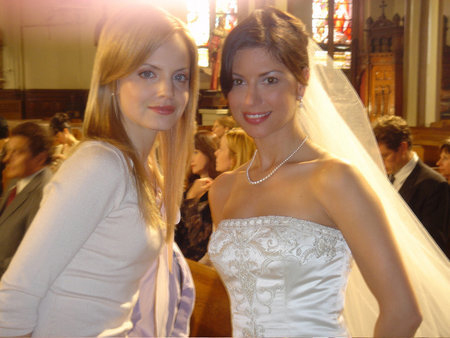 Mena, youíre based in California, I
assume. What was it like to shoot in Brooklyn and Manhattan?
Mena, youíre based in California, I
assume. What was it like to shoot in Brooklyn and Manhattan?
Mena Suvari:
It was wonderful. Iíd love to work here more. I mean, I worked a little
bit in Brooklyn and I worked here in Manhattan. I stayed in Greenwich
Village. It was great. Three months I was here. The end of summer, the
beginning of fall is a really nice time of year. It was wonderful. I love
New York. I knew you couldnít fake it well. Iíve worked on films that are
supposed to be New York but youíre frickiní in Canada. Itís just not the
same. Thereís definitely an energy to the city that is captured.
Freddie Prinze, Jr.:
I think Iíve made five films here now. Every one I had to fight to get made
here. Because they want to save money and make moneyÖ but thatís economic
treason. Again, this is my soapbox. Nobody really seems to care. Except me.
Iíve gone to SAG meetings. Itís me and a bunch of extras. Because no actors
go there Ė they donít have time for that stuff. They donít know whatís going
on. But itís not even a discussion. Itís a joke. They say they want to do
it, but they want to cut their motherís throat for another role. So itís
just one of those things where it was important to me that it be made in
Brooklyn. Brooklyn is like a time capsule. We didnít even change the sets.
It still looked like 1985. So itís just a wonderful place to film. I was
glad that we got the heartbeat and the energy of the city. Itís important.
Youíre not thought
of as so much of a New Yorker, but youíve done several films in New YorkÖ
Freddie Prinze,
Jr.: Iíve
done five films here. I live here. 90% of my family lives here.
There is a big
Puerto Rican community hereÖ
Freddie Prinze,
Jr.: Iím
the only one in LA when Iím in LA. I did my show and one of the characters
on my show last year spoke Spanish, so I had a big Spanish audience and
every week Ė we did a live audience Ė and I would speak to them in Spanish
and say how many Puerto Ricans are here? (silence) How many Mexicans
are here? (mimics crowd noises) Iíd say how many from El Salvador and
the Mexicans would boo them. Theyíve got beefs with the Puerto Ricans now.
They used to protest my dad for getting that job. But now theyíre cool with
him, because weíre crazy. Then I come to New York and itís like how many
Puerto Ricans (mimics yelling).
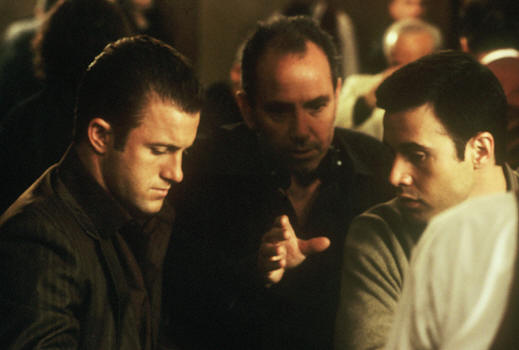 Youíre resubmitting
your New York bondÖ
Youíre resubmitting
your New York bondÖ
Freddie Prinze, Jr.:
You know, whether they take me or not, Iím here. Iím like any other Puerto
Rican, weíre here. You donít want us here? I know, itís okay. (laughs)
But weíre not going anywhere. Weíve got no place else to go.
Your father didnít
play a Puerto Rican?
Freddie Prinze, Jr.:
My father played a Mexican. He was Chico on the show Chico and the Man.
I knew that, but I
guess I never realized he wasnít playing his background. I
just I thought it was rightÖ
Freddie Prinze, Jr.:
(laughs) Okay. See, thatís the mentality out here. Everybody is like,
ďOh, of course.Ē Latinos Ė the reason we canít step up Ė the NCLR is kind of
a punch line at the end of a joke. Where the NAACP has power and authority
because you guys are able to unite. Latinos hate each other. (laughs)
The two most powerful Latinos in my business hate each other. If these guys
combined togetherÖ one of them owns like 600 theaters. The other has about a
billion dollars in his pocket. They wonít work together. (laughs)
They sabotage each other on a daily basis, because one came up in rich
Mexico and one came up in poor Mexico. Now thatís just Mexico. Now a Puerto
Rican trying to go in Ė I did a thing for them last year. They wouldnít even
speak to me in Spanish. Because Iím not Spanish enough. Now, when
they need something then Iím very Spanish. Then they need me when they need
crap. And if youíre Dominican? Forget it. Youíre out the door. So if one day
my people could kind of pull together, that would be nice. If they donít,
then Iíll just claim my momís Italian half. Iíll just go in that direction.
There you go, with this movie you bond
with your Italian rootsÖ
Freddie Prinze, Jr.:
(laughs) I speak better Italian than any New Yorker in this town.
They butcher the language so much. It makes my mom sick. My mom soeaks
fluent Italian and is very proud of her roots. Didnít let me watch The
Godfather until I was sixteen because she hated the fact that everyone
thought Italians were mobsters Ė even though some of her family I think
were. (laughs) Her brother. But I spoke Spanish and Italian before I
spoke English. I didnít learn English until I was like ten.
Mena, was it fun
putting together that 80s bouffant? Itís quite the contrast from nowÖ
Mena Suvari:
YeahÖ Somebody earlier was ďthe hair isnít
big enough.Ē I was like, what?? ďYeah, we thought there would be a lot of
80s hair.Ē I was like, well you know, we didnít want it to be too over the
top. But it did have the rollers everyday. Yeah, it was fun. The fashions
were definitely fun to play with. The simple sweet, kind of pretty girl, the
pearl stud earrings Ė that kind of thing.
Like you said, you were born in 1979
but this movie and also you upcoming film
Mysteries of Pittsburgh are about being
on the outskirts of the mob in the 80s.
Mena Suvari:
Another 80s period piece. (laughs) Itís funny, because youíre
talking about this film; itís a period filmÖ í85.
Was it interesting playing a different
time?
Mena Suvari:
Yeah itís fun. In this sense, it was really about having fun with the
atmosphere and the costumes and stuff like that. I donít think it really has
to do with the characters at that time. But, yeah, like Sonny [Caanís
character]Ö those were some great outfits. Sonny was very 80s, dude. The
Garden of Eden, which Iím going to work on takes place in 1926.
Where is that located?
Mena Suvari:
Weíre shooting in Spain, and it takes place in Spain and the south of
France. Iím very excited about that.
Are you going to play a zombie in
Day of the Dead?
Mena Suvari:
No, I actually play a corporal in the Army
and I save the day.
How good is your
marksmanship?
Mena Suvari:
Iím really good. Iím really good. I had my
gun training. I worked six-day weeks. I did all my own stunts. I may be
little, but Iíve got three older brothers and can hold a gun.
Can you whoop any of
them?
Mena Suvari:
Any of my brothers? Sure. Sure, I can.
You did
Six Feet Under. What was that like? Are
you going to do more TV?
Mena Suvari:
Thatís probably the biggest thing. When I started in my career I did
commercials and independent films. I did sitcoms that I worked my way up on.
So I think, yeah, thatís the biggest. I donít know, it would be about the
material. Thatís the thing. I donít want to put too much of a dividing line
between TV and studio and independent. I donít work like that. Itís about
the material. Itís about the content. Itís the work that I do. The acting.
Thatís the way I see things. I donít want to pass on something or judge
something based on whether or not it has money. I just donít look at it like
that.
Well, TV is a different process and
some people donít likeÖ
Mena Suvari:
Itís a very different process. And itís seen differently. Like
studio scene vs. independent. But I donít want to justify that viewpoint.
Thatís what Iím trying to promote Ė the creative aspect in this industry.
Itís not just a business. There needs to be more emphasis put on that. Not
just about likeÖ everything is about money now. Whether it gets released and
where is just losing the craft of it allÖ the creativity and the reason why
weíre doing this.
Freddie, is
New York Serenade your next thing? Are you done with that?
Freddie Prinze, Jr.:
Iím finished with it, yeah. Iím all done with it.
Is that the next thing coming out?
Freddie Prinze, Jr.:
I donít know. It was an independent.
Mena Ė this movie that youíre shooting
in Spain, is that the next immediate thing?
Mena Suvari:
Yeah, Iíll be leaving in a couple of weeks.
Do you have other things planned?
Mena Suvari:
Not right now, no. Iíve been meeting on things, but I donít want toÖ I
try not to get too crazy. Iíve done things like that, where Iíve literally
gone back to back on something and had like two days off. Itís hard. Itís
not hard, but I want to focus on this and do it right. I donít want to
half-ass something. Be half in my head in one place and half in the other.
Especially with this part, The Garden of Eden is very, very deep.
Who is the director?
Mena Suvari:
John Irvin. Itís a Hemingway story Ė one of his last stories. Itís a
very complicated piece.
Well, nobody will suggest youíve
restricted yourself to any one genre.
Mena Suvari:
Thank you, that means a lot to me.
Freddie Prinze, Jr.:
The next thing Iím working on, I did Harold Ramis and Paul Reiserís pilot.
Forget the fact that Paul wrote it and heís a thousand times smarter than me
and a thousand times funnier than me. Then you bring Harold into the mix.
The amount of notes you get at one time, itís likeÖ slow down one second.
When I catch up this is going to be funny. But youíre going to have to start
over. Youíre saying this and youíre saying this and Iím just trying to keep
up. (mimics) ďIím sorry, weíre a couple Jews.Ē Sorry, okay, so here
we go. Then they hit me with a whole different set of notes. But I had such
an incredible experience. It was like a comedy lesson. I really hope it
goes. But unfortunately I donít know until Monday. Itíll be tricky. CBS has
never done a half-hour single camera [show] in the history of the network.
So, itís an ambitious show. I donít think its seeds are ambitious, but itís
ambitious. If that gets picked up, I would do a million episodes with those
guys. It was just incredible.
The only other thing that Iím doing isÖ
the guy who created my show last year (Conrad Jackson), my co-writer, he
wrote and is directing a film. Iím going back to Brooklyn. Iím producing the
film for him. Weíre going back to Brooklyn and grab a lot of the same crew
and trying to keep films in New York.
CLICK HERE TO SEE WHAT FREDDIE
PRINZE, JR. HAD TO SAY TO US IN 2016!
Email
us Let us know what you
think.
Features
Return to the features page.